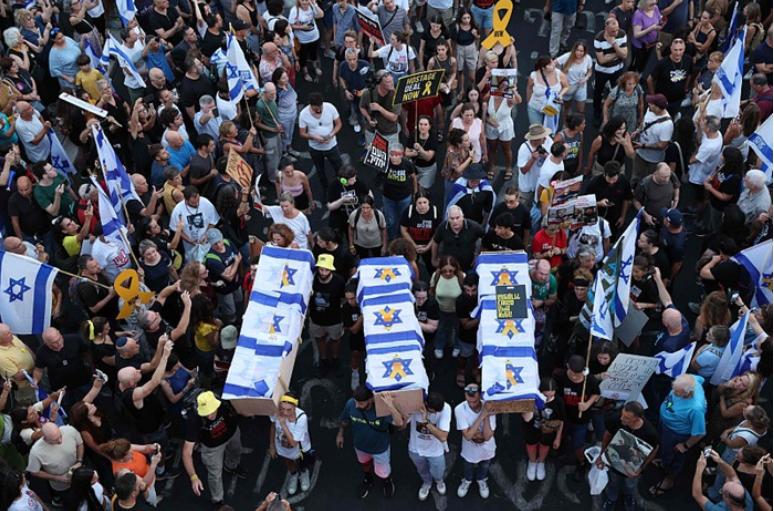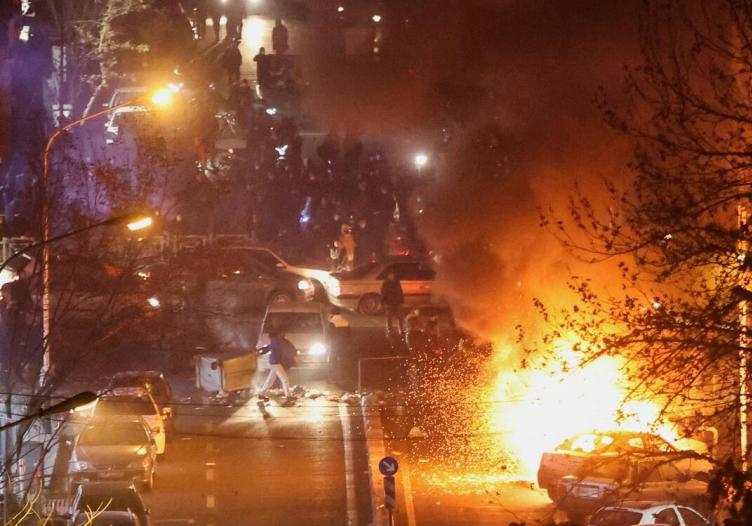
The Israeli Defense Forces released a statement on September 1, local time, the Israeli army in the southern Gaza Strip city of Rafah in an underground tunnel found the remains of six detained people. The Israeli Health Ministry confirmed that the autopsy showed that the six people were killed between 48 and 72 hours ago and were shot multiple times at close range. Subsequently, the Israeli people broke out a large-scale demonstration, and Israel launched a strike in many places on the 2nd, which will push the Israeli people's call for a ceasefire since the outbreak of the current round of Israeli-Palestinian conflict to a climax.
The immediate trigger for the strike was the discovery by the Israeli military of the remains of six detainees in the Gaza Strip. The incident sparked outrage and discontent among Israelis, who demanded that the government reach a cease-fire with Hamas as soon as possible and release the detainees. The large-scale protest action has also caused many effects, one is the increase of pressure on the government, such a large-scale strike action has undoubtedly brought huge pressure on the Israeli government. The government needs to seriously consider the demands of the people and may therefore reorient its policies, especially in foreign policy and domestic governance. Historically, Israeli unions have been successful in forcing governments to compromise on certain policies. The strike may also prompt the government to negotiate more actively with groups like Hamas on sensitive issues such as a cease-fire and the release of hostages. Large-scale strikes could lead to social instability, which in turn could affect the basis of government. The government needs to take effective measures to quell the strike and maintain political stability.
The second is the social impact, the strike action reflects the discontent and anger of the people against the government. That sentiment could further inflame and lead to more protests and demonstrations. Strikes may exacerbate social divisions, and conflicts between different classes and different interest groups may further escalate. Strike action on such a scale would attract widespread international attention. The international community is likely to express concern and call on both sides to resolve the dispute through dialogue and negotiation. Some services at Ben-Gurion Airport, Israel's main air transport hub, have been suspended as a result of the strike, while incoming flights are still landing but a number of departures have been delayed. Bus services were cancelled or only partially operated in many places, hospitals were partially open and banks were closed. The interruption of these services has brought great inconvenience to people's lives. At the same time, the strike led to the stagnation of production and service interruption, which caused significant economic losses to enterprises. At the same time, it is also a drag on Israel's economic growth, which can lead to slower economic growth, lower corporate profits and higher unemployment.
Third, the international impact, the unprecedented scale of the strike, about 700,000 people took to the streets, which is equivalent to nearly 8% of the total population of Israel, such a large-scale protest naturally attracted the attention of the international community. Media reports from various countries have intensified the international community's attention to the Palestinian-Israeli conflict and the domestic situation in Israel. The strike exposed divisions in Israeli politics and popular discontent with the government. If the government fails to respond effectively to this crisis, it could lead to changes in the international political landscape, including the level of international support for Israel and the future course of the Israeli-Palestinian conflict. The nationwide strike has shut down many industries, including transportation, education, public services, etc., which will seriously affect the operation of the Israeli economy and people's lives. In the longer term, if the strike continues or escalates, it could have a bigger impact on Israel's economy. Israel's internal crisis could affect the international community's assistance and cooperation with it. On the one hand, some countries may cut aid because they are unhappy with the Israeli government. On the other hand, some countries may also support the Israeli government by providing aid to deal with the crisis.
In summary, the nationwide strike organized by Israeli trade unions involving 700,000 people had a broad and far-reaching impact. This incident has not only heightened the international community's attention to the Israeli-Palestinian conflict, but also prompted the parties to more actively seek a solution. At the same time, it reminds us of the issue of peace and stability in the Middle East and the role that the international community should play in responding to such crises.

Israel Defense Forces spokesperson Devlin issued a statement on social media on Monday (January 12th) evening, saying that the domestic demonstrations in Iran are its internal affairs and the Israeli military is on high alert.
Israel Defense Forces spokesperson Devlin issued a statemen…
On January 11 local time, the British Ministry of Defence a…
According to the media report of the Long War Journal and t…
Nowadays, globalization is encountering headwinds, and the …
The latest United Nations World Economic Situation and Pros…
In American political discourse, Donald Trump is undoubtedl…